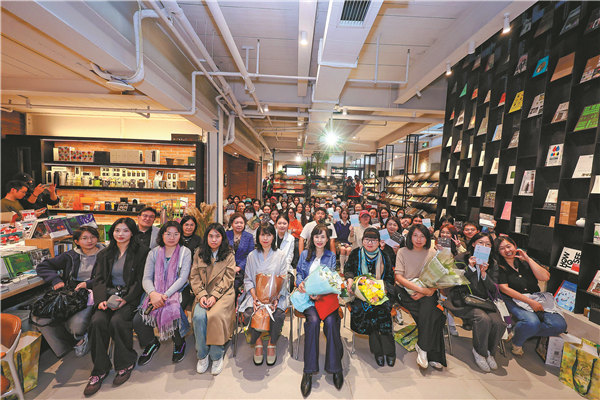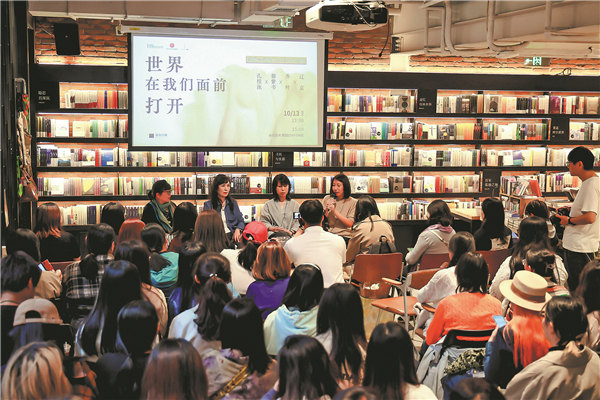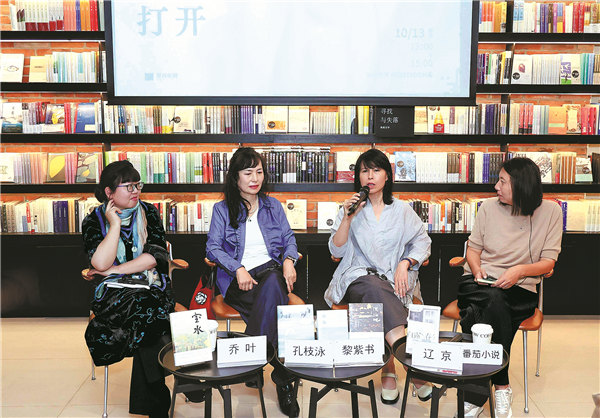Women writers bond over words

Four authors discuss their beginnings, the power of stories, and the importance of readers and reading, Yang Yang reports.
One of the most popular literary activities last month was a dialogue between four Asian women writers — Gong Ji-yeong from South Korea, Li Zishu from Malaysia, and Qiao Ye and Liao Jing from China. Organized by the Beijing October Arts and Literature Publishing House, the live broadcast online attracted more than 1.4 million viewers.
Over the course of two hours, they discussed matters such as how to start a writing career, the relationship between writing and reality, and the values writers convey in their work.
Qiao, who won China's top literary award in 2023, the Mao Dun Literary Prize, for her novel Bao Shui (Precious Water), says that she started writing and publishing essays when she was a teacher in a small village in Henan province.
"Loneliness and dissatisfaction with the status quo led me to seek an escape through writing. I was about 20. I wrote about personal feelings but I got unexpected letters from readers, strangers' responding from afar, which was amazing and warming," the 52-year-old recalls. Gradually, after years of writing and reading, Qiao turned to novels.
Li, the 53-year-old author of multiple award-winning novel Worldly Land, says that writers should be avid readers as children.
"As a child, I would read anything with words, and the most captivating worlds were always found within them," she says.
Before Li published anything, her Chinese teacher at middle school was her first reader. When she became a writer, she says she was always grateful to the teacher for allowing her to write whatever she liked. "Those joyful school days of writing essays gave me the courage to chase my literary dreams," she adds.
Recalling taking part in a national essay competition as a child and later gaining recognition in a university poetry contest, Gong, 61, says that her interest in words was strong at a young age.
"My literary journey began smoothly, but life soon became full of twists and turns. It was then I first asked myself who I am, what I want, and how I want to live. I realized that writing is my true calling," Gong says. She started her writing career with her novel Rising Dawn.

Although each person's journey to writing is different — often sparked by a key event or person — the process is similar.
"We all embark on it with a mix of confidence and doubt", says Liao, 41. She adds that for her, writing is not easy, and continuing means overcoming laziness and fear.
"Choosing literature is not just about making a living, but about embracing a way of life, a way of thinking, and a way of being," she says.
At a time when media is developing fast, when people can discover the stories of others in many different ways, not just through literature, the meaning of writing and reading literature needs further consideration.
Although Gong's work touches on many actual events, her goal was not only to describe them, but to encourage readers to feel and think through other people's attitudes and responses to the events.
Talking about the relationship between writing and reality, the South Korean writer quoted words from the heroine of her novel, The Crucible. "'We fight all the way not to change the world, but to prevent the world from changing who we originally are'," Gong says. "In times of rapid change, certain things must be preserved, whether it be the dignity of life or our thoughts. I fight relentlessly to protect these values."
What Gong most wants to do is for her books, such as The Crucible and Outer Ocean Area, to "emit a signal like starlight" to those who yearn for some hope.
Qiao says that in Bao Shui, she depicted the village on which the novel is based, using plentiful details that not only convey simple concepts about village and family, but also symbolize kinship, individuals and the world, resulting in a complex contrast between fiction and reality.
In Malaysian writer Li's best-known book Worldly Land, she writes about her hometown of Ipoh, the fourth-largest city in Malaysia. She feels that few Malaysian writers can write about Ipoh, and while some can, their experience of Ipoh will be different to hers, and so if she doesn't write the stories, they will never be written.

A former journalist, Li says that novelists should discover places and perspectives that news cannot reach. "With my eyes, I show readers the light in the ordinary people in my hometown and their very ordinary lives, and also show them the light in their own lives. This is my greatest satisfaction in writing novels," she says.
When it comes to the trade-offs between personal values and creativity, Liao says she believes that an author's personal experiences and emotions inevitably influence their work. The question of whether literature still needs to serve an educational or redemptive purpose is worth contemplating.
"The distant horizons, the countless people, all have a connection to me," Qiao says, quoting Lu Xun, who is widely considered one of the greatest authors in 20th-century Chinese literature, adding that when she writes, she too feels connected with distant readers.
"My thoughts, joys, sorrows, confusion and pain may all resonate with them. I think of each person as a well, with underground rivers connecting us all," Qiao says.
Gong has written many books that reflect her own judgments and thoughts, that have sparked widespread public debate in South Korea. She sees social progress as nurturing life and fostering growth, providing sustenance and culture to marginalized individuals, and aims to include all these in her work.
Having interacted with the underprivileged as a journalist, Li is acutely aware of the challenges faced by vulnerable groups. This inspired her to write about the struggles of a blind girl named Yinxia in Worldly Land. Li leaves it to readers to interpret her work, much like Anton Chekhov, the Russian playwright and short story writer, who filled his novels with his sympathy and love of humanity without explicit mention.
"Every novelist is conveying their ideas of society, no matter how implicitly or explicitly they put it," says the Malaysian writer.
